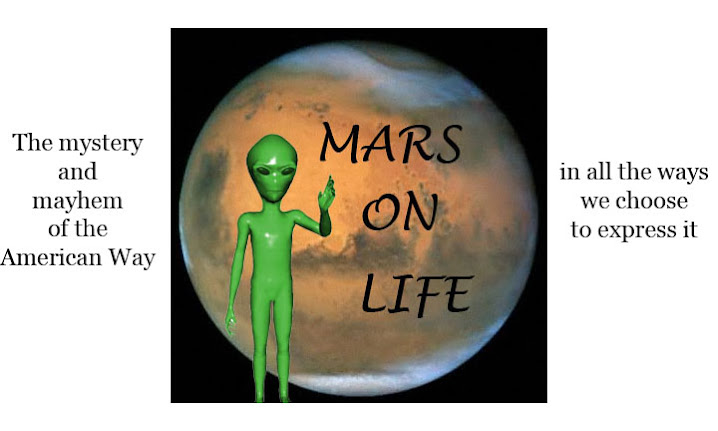
Suppose you decided to look at life not as you face it in your daily routine but through the prism of people who all have something very immediate at stake. Having something at stake is a guiding principle in first-year acting classes; blobs are never interesting and no one cares whether they live, die, or carry on as a blob. When living life to the full, it is not possible to so much as carry a spear without emotional investment.
Or a knife. On Top Chef, Bravo's popular competitive-cooking show, the contestants are avenging angels armed with cleavers, slicers, zesters, corers, bread and boning implements. Don't let the culinary theme fool you, however. Top Chef is a lesson in survival and in how survival is inextricably linked to creativity and what employers like to call "thinking on one's feet."
Chefs are not like most of us, who need only prove our powers of transportation in short bursts of creative energy followed by long periods of rest and recalculation. A chef must prove his mettle and his magic in both the short and long haul, subject to fluctuations in season, temperature, ingredient, supply, trend, cost, and expiration date. And this is all before the chef takes up his knife and encounters the encroachments of skill, seasoning, and eye appeal.
A chef is not a plastic surgeon or an airline pilot. One might allow the surgeon or pilot the occasional quackery or lapse in judgment--shit happens--but the chef must act and produce with a chilling accuracy. Public demand would have it no other way; whose day would not be ruined by slurping a rotten oyster?
To that end, the Top Chef contestants are thrown together into a steaming kettle of competition so close to boiling over that they have no recourse but to commit the simplest of human errors, like leaving scales on a fish or mistaking raw beef for rare. Each week, they are subjected to two challenges, the quickfire and the elimination. In the first, the winner gets immunity from elimination and in the second he must display his culinary derring-do and powers of transportation either independently or as a member of a team.
Transportation is found at rare coordinates, its terminus a Brigadoon-like, floating destination. Existing on the outer fringe of gratification, it is both an emotional and a sensory experience. Getting there demands a nearly impossible combination of dexterity, imagination, and salt.
Season 4 of Top Chef takes place in Chicago, one of America's culinary capitals and home to not just the Bulls, the Bears, and the Cubs but to the meaty swordsmanship of the flaming shish kebab. The contestants are largely culled from other culinary centers and, unlike the short-order cooks and punching-bag pancake turners of Hell's Kitchen, demonstrate a foreknowledge of technique and a capacity for creation. Likewise, the judging is not about production and delivery but about intellect and ephemera. Whereas Ramsay's chefs suffer a jarring frequency of human miscalculation, those of Top Chef suffer from the unbearable nearness of brilliance.
The striving and failing to quite measure up is in many ways more reason to watch than the food, which often borders on the meticulous. In an attempt to satisfy both lay and professional critics, dishes skew towards the latter. You are reminded that people pay good money for the pleasure of a lone shrimp or a dab of vegetable caviar, either of which can be instantly undermined by over- or underdeveloped seasoning. More than the final outcome, it's the thought process and social dynamic that excite, since the chefs are rarely affected by any sort of chef's block and yet frequently find themselves in do-or-die battles of will with their fellow competitors.
When contestants work as a team, they either agree or agonize. In episode 5, where 80 people were to be fed at a banquet, quickfire winner Antonia refused to hear teammate Spike's plea for a butternut squash soup. Antonia's bullying led to dreary mushrooms which in turn led to the elimination of Zoi, one half of the show's premier lesbian couple. It ended, as such tiffs are wont to do, with a reductio ad absurdum. Antonia had not vetoed soup; this she claimed was on film and yet the film shows her arguing vehemently for her beef carpaccio with mushroom salad and sunchoke aioli. The dismissal of Zoi incited the fiery antagonisms of her lesbian partner, who kicked a folding chair into a wall. In an apparently simultaneous incident another contestant nearly cracks under the pressure of his own tirade. The feeling is Proustian: We are as we are allowed by others.
Sound familiar? A bit of lousy luck, an ineffectual defense, incongruous rosemary, poor conceptualization, gossiping, fudging, accusations and second-guessing of oneself. It's just another day at the office. If not for the food, it might well be an advertising agency or an Internet start-up. Ego is at stake, as it always is. Someone goes home still defending the poorly executed idea. Next week, someone else will leave a pinfeather on a chicken. All of life is there, sometimes in arrogance, waiting for a Wüsthof to carve away its skin.
Top Chef isn't about food any more than it is about Padma Lakshmi. Both food and hostess are decorative elements, aesthetically pleasing but entirely secondary to skill, gamesmanship, and the law of the jungle. The most venal sin, of sacrificing taste to presentation or gizmo, is only an occasional issue. What astounds is the simplicity of the errors, something that can probably be blamed on the brain's seizing up under the intensity of competition. The pressure-cooker environment only enhances the natural human worry about measuring up, and fear leads to oversight. Primped with self-confidence, many of the young chefs learn that their skill has left them in the lurch and that their nonchalance with the most basic of tasks is their undoing. Often, it appears that they haven't even tasted what they've wrought, either that or their palates are of a different sensitivity and sophistication than those of the judges. Their ideals are not high enough, nowhere near high enough, but they have come anyway, confusing wishing with winning and artistry with pleasure.
Only those shrewd enough to unpack equanimity along with their knives last long enough to have a shot at the prize, but this is true of everything. That's the idea, anyway, and you don't need to debone a quail to make it so.
Saturday, April 12, 2008
Out Come the Knives
Labels:
Top Chef,
Top Chef Chicago,
Top Chef Season Four
Subscribe to:
Post Comments (Atom)









1 comment:
Other than Project Catwalk (and not the deplorable Project Runway), Top Chef is the only competition show I can stand. But even so, the constant sniping tends to weigh down what would otherwise be a brilliant show. People - be better to each other.
Post a Comment